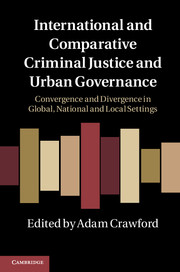 International and Comparative Criminal Justice and Urban Governance
International and Comparative Criminal Justice and Urban Governance Book contents
- Frontmatter
- Contents
- List of figures
- List of tables
- Notes on contributors
- Acknowledgements
- 1 International and comparative criminal justice and urban governance
- PART 1 International criminal justice
- PART 2 Comparative penal policies
- 8 Penal comparisons: puzzling relations
- 9 Why globalisation doesn't spell convergence: models of institutional variation and the comparative political economy of punishment
- 10 Penal excess and penal exceptionalism: welfare and imprisonment in Anglophone and Scandinavian societies
- 11 The impact of multi-level governance on crime control and punishment
- 12 Explaining Canada's imprisonment rate: the inadequacy of simple explanations
- 13 US youth justice policy transfer in Canada: we'll take the symbols but not the substance
- 14 Liberty, equality and justice: democratic culture and punishment
- PART 3 Comparative crime control and urban governance
- Index
- References
11 - The impact of multi-level governance on crime control and punishment
from PART 2 - Comparative penal policies
Published online by Cambridge University Press: 05 June 2011
- Frontmatter
- Contents
- List of figures
- List of tables
- Notes on contributors
- Acknowledgements
- 1 International and comparative criminal justice and urban governance
- PART 1 International criminal justice
- PART 2 Comparative penal policies
- 8 Penal comparisons: puzzling relations
- 9 Why globalisation doesn't spell convergence: models of institutional variation and the comparative political economy of punishment
- 10 Penal excess and penal exceptionalism: welfare and imprisonment in Anglophone and Scandinavian societies
- 11 The impact of multi-level governance on crime control and punishment
- 12 Explaining Canada's imprisonment rate: the inadequacy of simple explanations
- 13 US youth justice policy transfer in Canada: we'll take the symbols but not the substance
- 14 Liberty, equality and justice: democratic culture and punishment
- PART 3 Comparative crime control and urban governance
- Index
- References
Summary
Introduction
Within the sociology of punishment, a veritable industry has built up both charting and theorising changes in the nature and function of crime control and penal practice in the context of late modernity (Garland 2001; Feeley and Simon 1992; O'Malley 1992). In this chapter, I will suggest that this field of scholarship has become dominated by a methodological dualism between accounts which lay emphasis on structural factors and those which lay emphasis on cultural factors. I will argue that this dualism constrains our capacity to understand the variations in crime control and penal policy which are evident across many Western jurisdictions, principally because it fails adequately to capture the multi-level nature of contemporary modes of governance both above, but, more particularly, below the nation state. A key aim of the chapter is to set out an alternative methodological strategy with which to interrogate recent developments; a strategy which draws on the vocabulary of systems theory. The chapter is built around a case study comparing Scotland and Spain with England and it comprises four interrelated parts. Part 1 overviews key variations in crime control and penal policy within my selected jurisdictions as they have evolved over the past forty years. Part 2 describes the methodological dualism within the sociology of punishment and highlights its limitations in terms of this case study. Part 3 sets out an alternative methodological strategy. Finally, Part 4 implements this strategy, offering a rereading of the case study within its own terms.
- Type
- Chapter
- Information
- International and Comparative Criminal Justice and Urban GovernanceConvergence and Divergence in Global, National and Local Settings, pp. 276 - 303Publisher: Cambridge University PressPrint publication year: 2011
References
- 5
- Cited by


